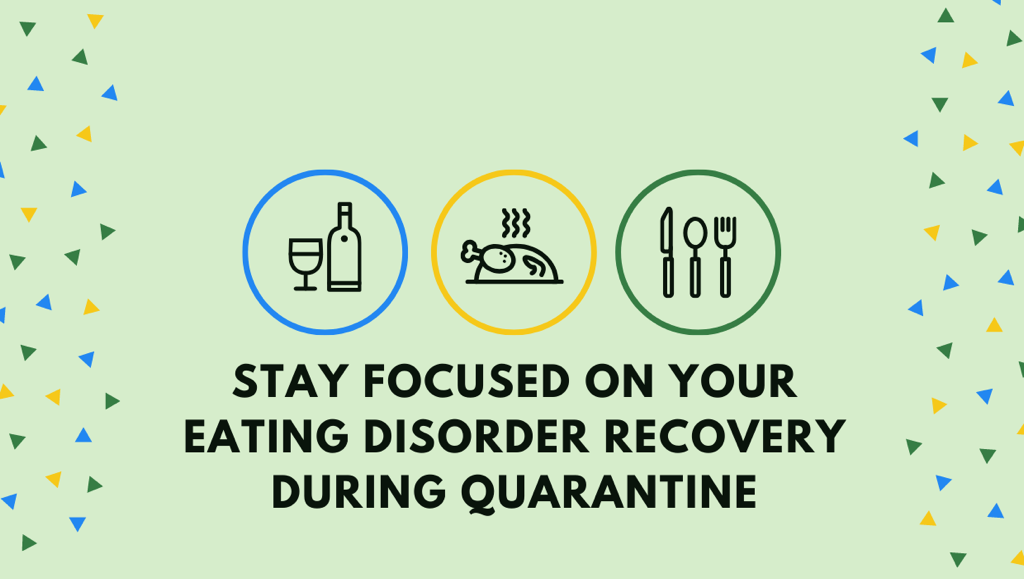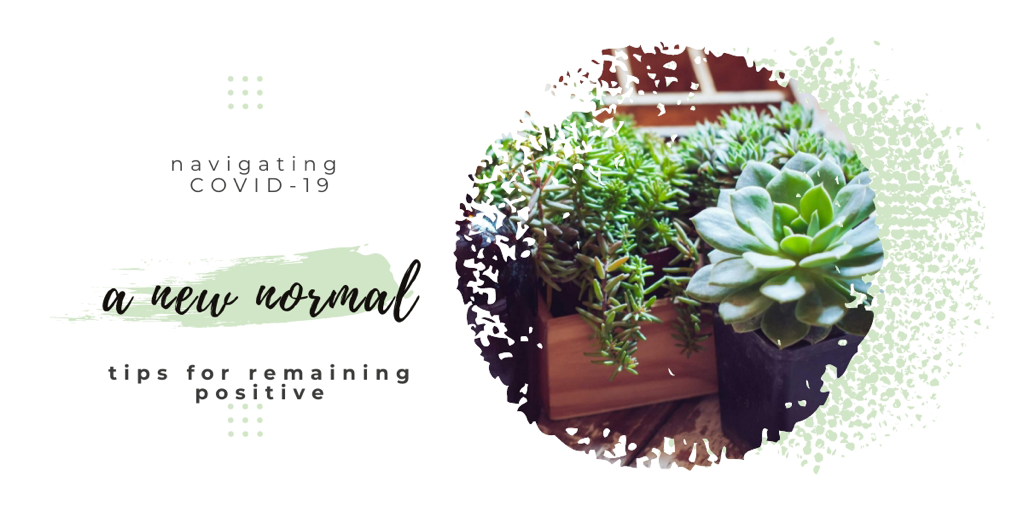|
Scouring the Internet, you will find thousands of articles directed to coping with eating disorders or disordered eating behaviors (DEB) during the holidays- but what about navigating your recovery during quarantine? Being isolated within your home exacerbates this daily struggle for anyone who has a difficult relationship with food. Isolation, stock piling, and the uncertainty surrounding the duration of this stay at home order can cause those in ED recovery to backslide.
Our daily lives have been largely interrupted by the Covid-19 outbreak, that much is undeniable. Time can feel like it is crawling at a snail’s pace, and the amount of time available to us is much more unstructured comparatively to our normal. This extra time may make mindless snacking more accessible. To combat this, try placing your snacks into bowls or plate them. This will prevent you from insentiently eating from the bag. Eating at designated locations can also improve your consumption habits, sitting at the table can create a specific zone for food other than your bed or your couch. This helps instill the mindset that meals are important and crucial, not an option to negotiate with your negative self-talk. Designating this space will separate your meals from places where relaxation should be the goal- like your bed or the couch. This clear delineation will stress the importance of mealtime and leisure time so your eating disorder will not blend the two. Challenge your impulse control by practicing the five-minute rule. Binge eating can be used as a source of comfort during these uncertain times, but this behavior is unhealthy and can easily become a problem even for those who have not experienced an eating disorder before. You may not be able to delay the binge entirely, but that is alright. Change does not happen overnight, and the goal for this delay is to create new habits for your brain. Try drawing or reading for five minutes or play a fun game on your phone to interrupt the pattern of binge eating. Talk to people about how you are feeling. Eating disorders contrary to what most people think are typically oriented around an avoidance of feelings, which in turn creates isolation, secrets and avoidance of those close to you. Food will forever be a part of your life that you engage with every day, and that can be a frightening thing for those in recovery for these behaviors. Speaking with someone close to you about your anxieties and fears can help alleviate the need for control that many people suffering from these disorders are looking to dispel. You may even try having meals with those who are not in your home via Facetime or Skype, this will help you remain accountable for your meal consumption and ease the anxiety surrounded by mealtime. If you are quarantined with others, try to form happy scheduled meals to enjoy with them. This will again reshape your thinking behaviors with food, instead of meals being associated with negativity and anxiety, your brain will learn to associate these times with laughter and shared experience. Curtail your social media exposure. Social media can be a tricky place for those who are struggling with their body image during regular times but add that to our inability to spend time outside the home combatting these images with enjoyed activities can be detrimental. There are plenty of memes circulating about Quarantine Weight Gain and although these seem innocent enough, they can be triggering for those suffering from DEB. Eliminating all social media may be too isolating during this time for those struggling, so try following a few accounts to break up the feed you are exposed to. Eating disorder recovery pages are a dime a dozen on Instagram and Facebook, following just three of those will make enough of a disruption to help you feel better while you scroll through. Cutting back your social media exposure may be necessary at this time but remain gentle with yourself. Allow yourself to eat your favorite foods. Remember, the key here is moderation not elimination. Your favorite cookies are safe and alright to eat but try not to eat the entire sleeve. If you remove these things entirely, your body may feel deprived which can lead to relapses and binging. All or nothing thinking is common with those who suffer from DEB, which can translate to all or nothing restrictive habits. We are looking for the middle ground here! Do not beat yourself up for enjoying foods you may have previously deemed bad. Emotions should not be ascribed to foods; they are a source of substance and energy. You can also try interrupting your cravings for by snacking on a mix of ‘healthy’ and ‘unhealthy’ foods, try some carrot sticks and ranch around lunch and the cookies after dinner. This will not only keep you fuller for longer, but it will train your brain to accept varieties of food which can be a difficult concept for those who have previously eliminated certain food groups entirely. Reintroduction slowly is a huge part of the recovery process. Our favorite suggestion, because we are biased, reach out to a professional! A licensed therapist or counselor may just be the ticket to navigating these difficult times with your eating disorder. Online therapy has never been more accessible or covered by insurances as it is right now so taking advantage of this is crucial. You may feel guilty confiding your fears with those who are your family or friends, maybe you have been in recovery for a long time and you worry they may misinterpret your anxieties surrounding food now as a relapse. Sharing these concerns with a professional can keep you accountable without the pressure of adding fear to those you love in your daily life. Lastly, remember, everyone is struggling during these times. You are not alone in feeling new or old anxieties resurfacing. More people than ever are struggling with old coping behaviors and habits. No one has it all together, we are all experiencing a huge number of transitions and changes to our routine which has a direct impact on our anxiety levels. With so many things changing, remind yourself that it will return to normal eventually. Your eating disorder will never truly go away and be patient because that is not the goal of recovery. Recovery is a beautiful thing, but it is about dealing with the cravings and habits and finding healthy ways to work with them, not against them.
1 Comment
They say opinions are like elbows, everyone has them, but they only bend one way. When it comes to marriage, you would think we all have four sets of arms with the amount of advice and opinions people offer! Particularly when you are beginning a new stage of your relationship (marriage, having children) or having trouble in a relationship, solicited and unsolicited advice can overwhelm you and your partner.
With even more time being spent out of the classrooms because of the quarantine, you may be faced with new roles within your household. Parent may be a familiar term within your home, but what about teacher? It goes without saying that educators play a pivotal role in shaping the minds of our children, they statistically spend the most time with them. So how do you go about navigating this role? While the teachers are still assisting your child through distance learning tools, there are ways you can cultivate your child’s self-esteem while you spend this time in your home.
Self-esteem and self-efficacy are constantly worked on during a child’s education. Within the classroom, social modeling is one of the strongest influences on self-efficacy. When a child can see other students working hard to complete a task and accomplish a task, it is reinforcing that through hard work they can as well. This increases their belief in themselves and creates a higher likelihood of beginning new tasks with this sense of confidence. To continue this modeling while we remain socially distant, try modeling your own hard work. Let your child see that you are working from time to time and explain when appropriate that though your work is not always easy, you feel a sense of pride when you accomplish goals set within your company. Another important factor that parents may struggle with opposed to teachers in a traditional setting, is remaining honest with your child. A teacher can be more objective when educating your child and as parents we sometimes struggle separating that your child’s failures are not a direct extension of yourself! If a child does not succeed in completing something, do not disregard the failure entirely. Notice this moment, acknowledge the failure and make suggestions to improve their likelihood of success next time. It may feel better to just brush off the failure in the moment, but this is ultimately doing a disservice to your child. Social persuasion may also be experienced less while your child is learning from home. This is the concept that through specific praise and verbal encouragement, they will begin to believe they have the skills to succeed. These words of encouragement become your child’s inner dialogue and largely shapes their modality of thinking. Although you may be feeling overwhelmed during this time, try and offer words of encouragement when you child accomplishes tasks. Identify the effort they put into the assignment and reassure them that they have given their best effort and that is to be celebrated. Mastery experiences tie into the foundation of our education system. These are assignments that are ‘just right’ in terms of learning ability for your child’s age. Your child should feel this sense of confidence because these tasks strengthen their sense of self-efficacy. If your child struggles with Math specifically, but excels in English, try breaking up their assignments. If they spend the entire afternoon struggling with Math homework, they may begin to become discouraged. Breaking this up with tasks they struggle and excel in is one of the beauties of at home learning. YOU can help choose the order in which they learn. Suggest a break from the math assignment and try brainstorming that English essay for half an hour and then return to it. Although you can break up the subjects your child struggles with, you cannot avoid them entirely. When presented with more challenging tasks, your child may begin to express negative thoughts with you. Challenge these thoughts in calm and supportive tone. If they say ‘I will never be good at math, I don’t understand it’. Respond factually, “You may not be the best at math, but look at how much you have progressed, last year you did not know division at all, now you are doing long division!” Use evidence to support your claims but remember do not dismiss the negativity entirely. By simply disregarding the negative thinking, you pose the risk of your child not disclosing insecurities or doubts with you entirely. This opens up a healthy dialogue between the two of you to disclose things they have deemed as ‘failures’ and creates an opportunity for you both to work together to share suggestions. With this extended time we are all spending at home, it may also seem like the best way to develop self-esteem is through overwhelming praise. When else have you had the opportunity to cheer your child on throughout their entire school day? Though this may come from a good place as a loving parent, realize you need to take a step back. Let your child take risks and make their own choices. Your child will have a higher sense of pride and enjoy sharing their accomplishment from you. Supported independence is the goal with these tips, your child feels supported but you are not ‘doing’ the work for them. If you continue to over-praise your child, you may be doing more harm than good by setting the bar too low. Recognizing these moments as teachable for your child is something you can take away from this quarantine experience and continue when life returns to normal. We frequently forget how much teachers and their peers help shape our children’s inner voice and we can continue cultivating this within our own home and makeshift classrooms. Most importantly, try to enjoy this time with your children, remember they are impressionable and remain supportive for them. As we navigate this new normal, many of us are experiencing a myriad of emotions. Anxiety, grief, isolation, and depression may be some of the most fore-fronting emotions. There are less interactions happening outside our homes and the limited time spent outside is littered with masks, gloves, and awkward avoidance in a shared aisle of the grocery store. These concerns and more are all valid and a reoccurring discussion within our sessions via Skype- and simultaneously our own lives. Knowing you are not alone in feeling these things can be integral to maintaining a sense of community. However the line between realistic acceptance of the situation and hyper fixation can become blurred when so much time is being spent monitoring the progression of this horrible disease from our couch cushions.
One of the best ways to combat this fixation is to limit your news consumption- this includes social media! If you are continuously bombarded with statistics regarding “the curve” it is only natural that you will become stressed with conflicting sources of information. Turn the news off or set aside fifteen minutes each morning to watch the news and then continue about your day. Remaining motivated while working from home can be incredibly difficult. Try and integrate a sense of routine in your day, even though your commute time may be eliminated, orient your morning around a healthy breakfast and a cup of tea. Continue showering and brushing your teeth each day- although this may seem silly, this will maintain a sense of normalcy and keep depression at bay. And most importantly get out of your pajamas! Although you may not need to wear the suit and tie while working from home, those pants with the holes in the pockets certainly won’t help you focus on your company goals. Clothes help set the tone for your mindset, make sure you are not inadvertently setting yourself for a gloomy day. Stay connected with others. Although we are living in unprecedented times, we are also living in an unprecedented time for communication and connection. Download zoom or the Houseparty app, both of these features can connect you friends and loved ones. Set aside half an hour at the end of your day to unwind and speak with someone you care about. In the same way that a healthy diet is needed to stay well, social interaction should not be neglected. Most importantly, remember to be easy on yourself. Your goals may not (and in most cases shouldn’t) look the same as they did pre-quarantine. If the biggest thing you accomplished today was reorganizing one of your kitchen cabinets, congratulate yourself! Finding time to do a seemingly small task amid these uncontrollable factors is something to celebrate. Take frequent breaks if you need to and remind yourself this will pass, it cannot last forever. |
Archives
March 2024
|



